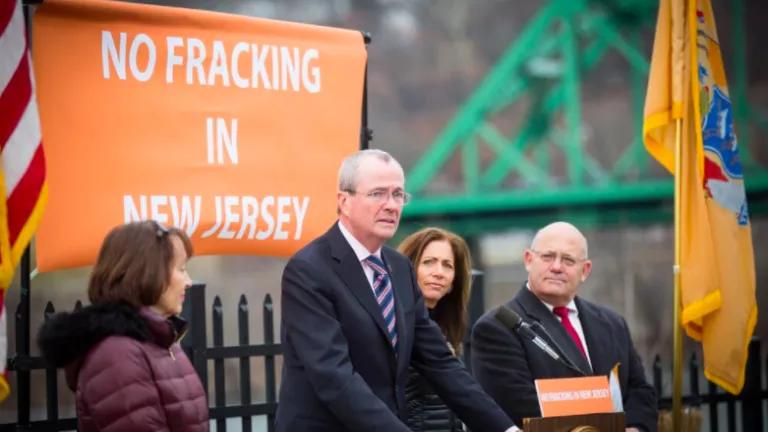NJ Governor Murphy Supports Full Fracking Ban in Delaware Basin

In a letter to the Delaware River Basin Commission (DRBC), New Jersey Governor Phil Murphy has announced his support for a ban on fracking and “all fracking-related activities” in the Delaware River Basin, the drinking water source for more than 17 million people across five states. He is the first voting member of the DRBC to come out in support of a ban that includes a ban on all activities related to fracking.
Two years ago, the DRBC put forward draft regulations that banned fracking, but that left the watershed vulnerable to the storage, treatment, disposal, and discharge of fracking wastewater. It also did not ban the withdrawal of basin water for fracking elsewhere. In his letter to the DRBC, Governor Murphy specifically requests that the DRBC amend the draft regulations to ”ban the import, treatment, and discharge of fracking wastewater in the Basin.” In order for a full ban to move forward, a majority of the five DRBC members, which includes governors of Delaware, New York, and Pennsylvania, as well as the Army Corp of Engineers—must also vote in support.
For more than eight years, NRDC and our allies have urged the DRBC to stop fracking in this important region. And since 2011, there has been a de facto moratorium on fracking and its associated activities.
Much like drilling itself, the storage, treatment, and disposal of contaminated fracking wastewater would endanger pristine fresh water supplies and the communities throughout the watershed that rely on them—in fact, fracking wastewater is one of the most dangerous aspects of the fracking process. As explained in an NRDC-commissioned report about the contents of fracking wastewater, a number of chemical additives commonly used in fracking have been associated with negative health effects. One study found that more than 75 percent of the chemicals used in fracking are associated with adverse effects on the skin, eyes, and respiratory and gastrointestinal systems; about 40 percent could have effects on the brain, kidneys, and nervous, immune, cardiovascular, and endocrine systems; and 25 percent are associated with cancer and mutations.
Additionally, banning fracking, only to extract and use fresh water for fracking elsewhere, both allows this dangerous practice to continue in other nearby areas while also depriving basin states of use of that water for more beneficial uses, such as drinking water and crop irrigation.
The Delaware River Basin extends from the Catskills in New York to parts of New Jersey, Pennsylvania, Delaware, and Maryland and is a vital water source for about 5 percent of the nation's population. Recognizing the watershed’s outstanding natural, cultural, and recreational contributions to the nation, Congress has designated several segments of the Delaware River and its tributaries for protection under the Wild and Scenic Rivers Act. Opening this special region to fracking would industrialize communities, contaminate drinking water, and destroy fragile ecosystems.
By supporting a full ban in the Delaware River Basin, Governor Murphy is demonstrating critical leadership at a time when the Trump administration is doing everything in its power to expand fossil fuel extraction. Governor Murphy is also showing what states can do to protect our environment and communities in the face of a hostile federal government.
We now look to the other governors who sit on the DRBC—New York Governor Cuomo, Pennsylvania Governor Tom Wolf, and Delaware Governor John Carney—to follow Governor Murphy’s courageous lead.
